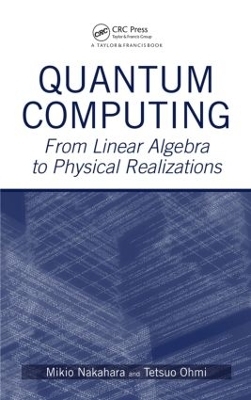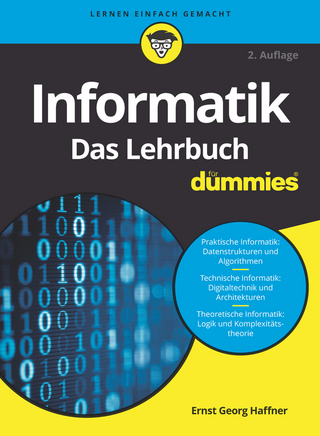
Quantum Computing
From Linear Algebra to Physical Realizations
Seiten
2008
Institute of Physics Publishing (Verlag)
978-0-7503-0983-7 (ISBN)
Institute of Physics Publishing (Verlag)
978-0-7503-0983-7 (ISBN)
With derivations, exercises, and solutions, this book examines the theoretical aspects of quantum computing and focuses on several candidates of a working quantum computer, evaluating them according to the DiVincenzo criteria. It covers theoretical tools, such as vectors, matrices, quantum gates, and integral and Fourier transforms.
Covering both theory and progressive experiments, Quantum Computing: From Linear Algebra to Physical Realizations explains how and why superposition and entanglement provide the enormous computational power in quantum computing. This self-contained, classroom-tested book is divided into two sections, with the first devoted to the theoretical aspects of quantum computing and the second focused on several candidates of a working quantum computer, evaluating them according to the DiVincenzo criteria.
Topics in Part I
Linear algebra
Principles of quantum mechanics
Qubit and the first application of quantum information processing—quantum key distribution
Quantum gates
Simple yet elucidating examples of quantum algorithms
Quantum circuits that implement integral transforms
Practical quantum algorithms, including Grover’s database search algorithm and Shor’s factorization algorithm
The disturbing issue of decoherence
Important examples of quantum error-correcting codes (QECC)
Topics in Part II
DiVincenzo criteria, which are the standards a physical system must satisfy to be a candidate as a working quantum computer
Liquid state NMR, one of the well-understood physical systems
Ionic and atomic qubits
Several types of Josephson junction qubits
The quantum dots realization of qubits
Looking at the ways in which quantum computing can become reality, this book delves into enough theoretical background and experimental research to support a thorough understanding of this promising field.
Covering both theory and progressive experiments, Quantum Computing: From Linear Algebra to Physical Realizations explains how and why superposition and entanglement provide the enormous computational power in quantum computing. This self-contained, classroom-tested book is divided into two sections, with the first devoted to the theoretical aspects of quantum computing and the second focused on several candidates of a working quantum computer, evaluating them according to the DiVincenzo criteria.
Topics in Part I
Linear algebra
Principles of quantum mechanics
Qubit and the first application of quantum information processing—quantum key distribution
Quantum gates
Simple yet elucidating examples of quantum algorithms
Quantum circuits that implement integral transforms
Practical quantum algorithms, including Grover’s database search algorithm and Shor’s factorization algorithm
The disturbing issue of decoherence
Important examples of quantum error-correcting codes (QECC)
Topics in Part II
DiVincenzo criteria, which are the standards a physical system must satisfy to be a candidate as a working quantum computer
Liquid state NMR, one of the well-understood physical systems
Ionic and atomic qubits
Several types of Josephson junction qubits
The quantum dots realization of qubits
Looking at the ways in which quantum computing can become reality, this book delves into enough theoretical background and experimental research to support a thorough understanding of this promising field.
Mikio Nakahara, Tetsuo Ohmi
FROM LINEAR ALGEBRA TO QUANTUM COMPUTING: Basics of Vectors and Matrices. Framework of Quantum Mechanics. Qubits and Quantum Key Distribution. Quantum Gates, Quantum Circuit, and Quantum Computer. Simple Quantum Algorithms. Quantum Integral Transforms. Grover’s Search Algorithm. Shor’s Factorization Algorithm. Decoherence. Quantum Error-Correcting Codes. Physical Realizations of Quantum Computing: DiVincenzo Criteria. NMR Quantum Computer. Trapped Ions. Quantum Computing with Neutral Atoms. Josephson Junction Qubits. Quantum Computing with Quantum Dots. Appendix. Index.
| Erscheint lt. Verlag | 10.4.2008 |
|---|---|
| Zusatzinfo | 10 Tables, black and white; 134 Illustrations, black and white |
| Verlagsort | London |
| Sprache | englisch |
| Maße | 156 x 234 mm |
| Gewicht | 748 g |
| Themenwelt | Mathematik / Informatik ► Informatik ► Theorie / Studium |
| ISBN-10 | 0-7503-0983-0 / 0750309830 |
| ISBN-13 | 978-0-7503-0983-7 / 9780750309837 |
| Zustand | Neuware |
| Haben Sie eine Frage zum Produkt? |
Mehr entdecken
aus dem Bereich
aus dem Bereich
Grundlagen – Anwendungen – Perspektiven
Buch | Softcover (2022)
Springer Vieweg (Verlag)
34,99 €
Eine Einführung in die Systemtheorie
Buch | Softcover (2022)
UTB (Verlag)
25,00 €


